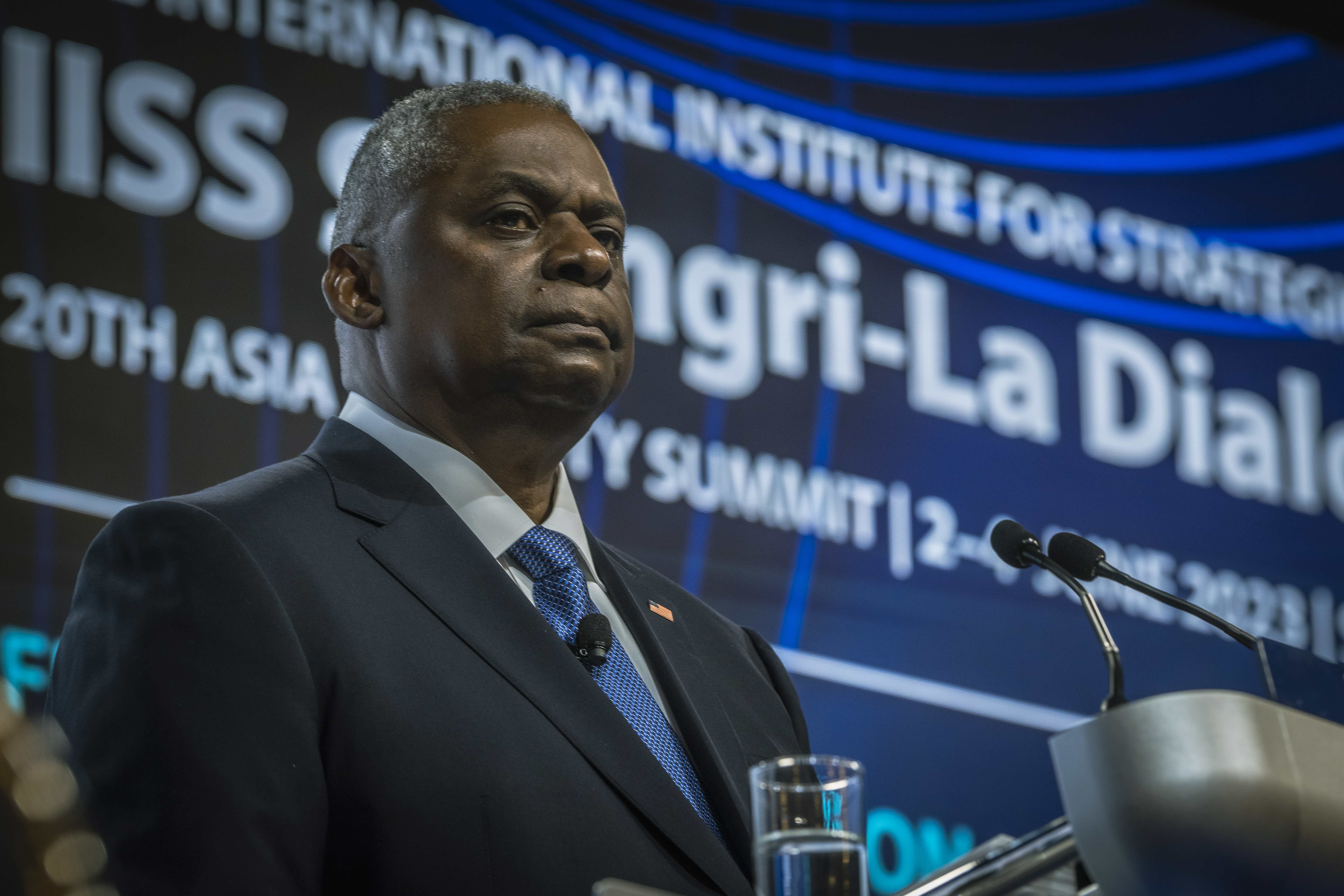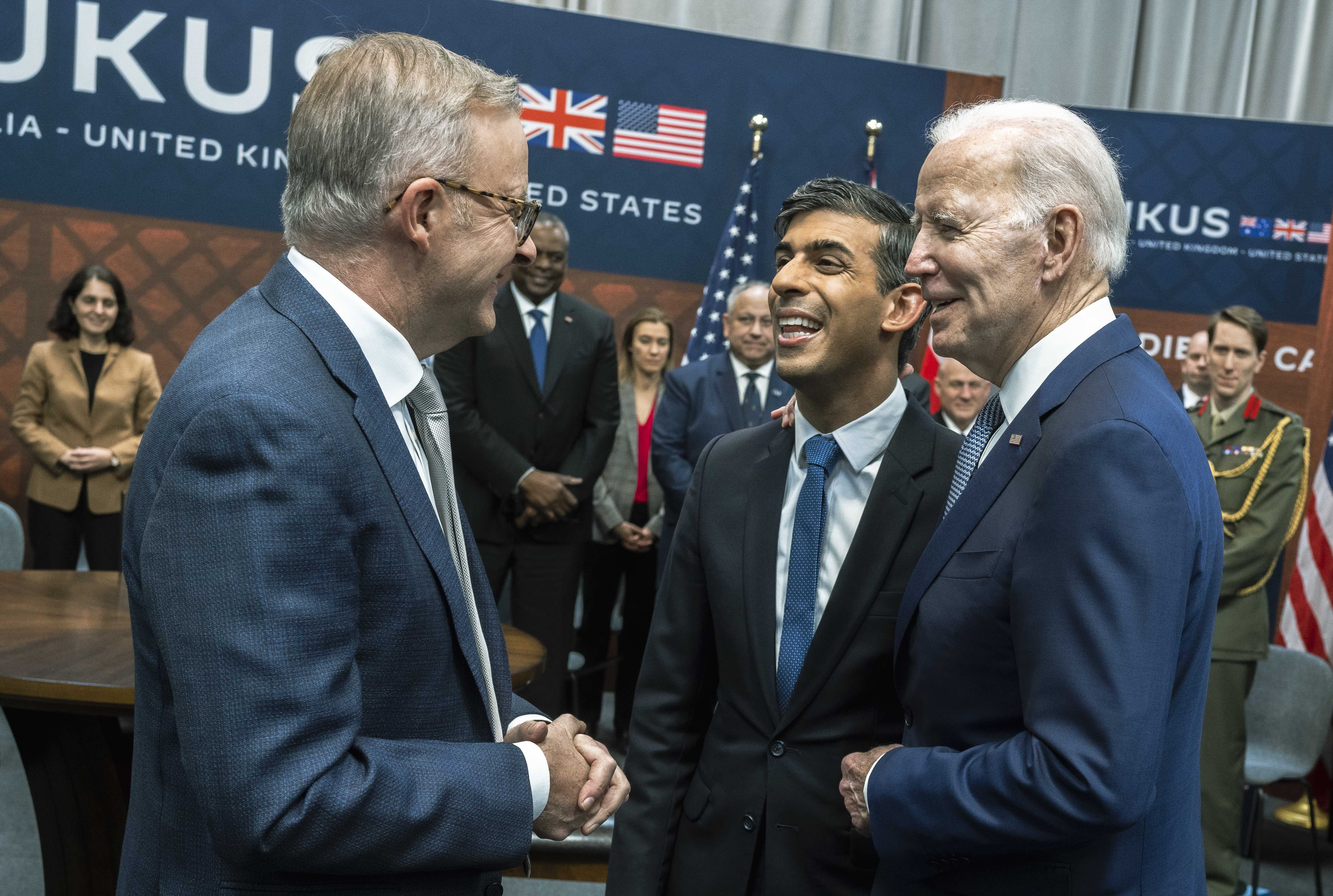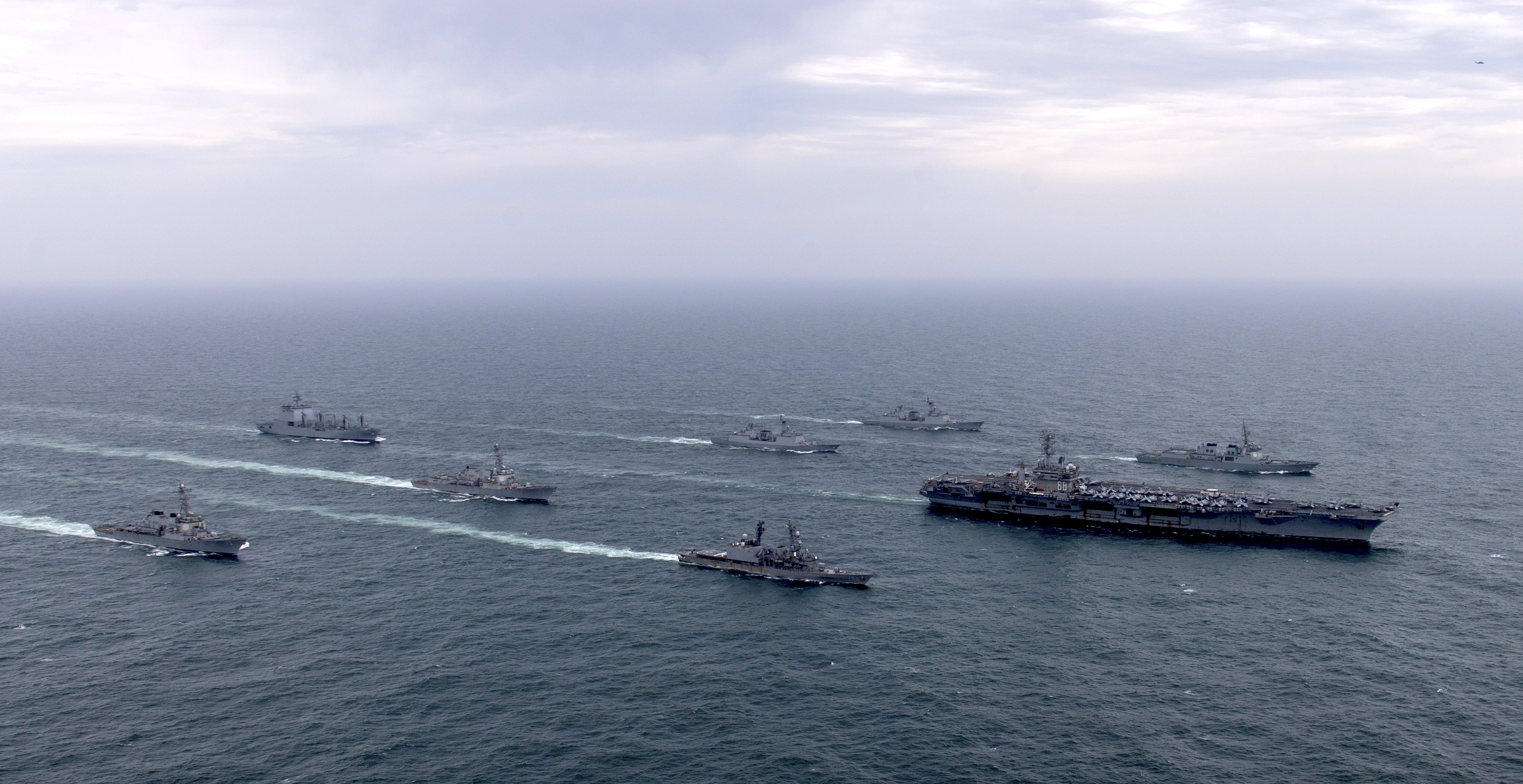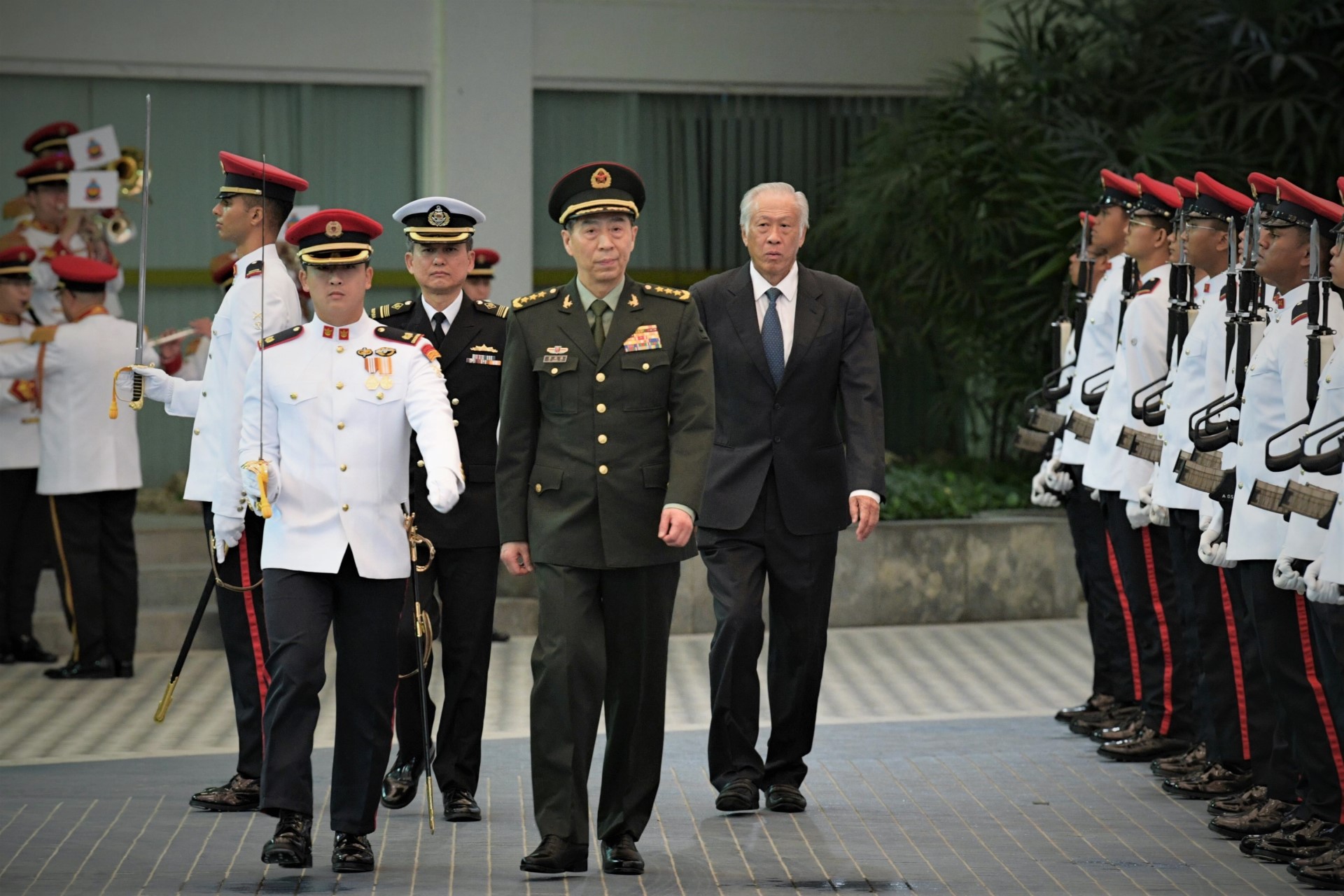
The U.S. will support its allies and partners when they defend themselves against coercion and bullying in the Western Pacific, Secretary of Defense Lloyd Austin said in a speech on Saturday.
“To be clear, we do not seek conflict or confrontation, but we do not flinch in the face of bullying or coercion,” said Austin in his speech at the IISS Shangri-La Dialogue in Singapore.
Resisting intimidation was especially important for international access to the Taiwan Strait but at the same time, he stated that the United States was committed to the status quo on Taiwan, in consistence with its One China policy and its obligations under the Taiwan Relations Act.
Shortly after his speech, U.S. and Canadian warships transited the Taiwan Strait, U.S. 7th Fleet announced.
China has long claimed that the U.S. seeks confrontation and conflict and accused Washington of stirring up trouble between China and countries in the Indo-Pacific region over maritime territorial claims, international boundaries and support for Taiwan.
Austin said American work in the Indo-Pacific together with its allies and partners has made the region stronger and safer but the U.S. understands the headwinds it faces.
“We won’t let those headwinds blow us off course,” he said. Austin also said the U.S. would work to ensure that no one country could exert control over the shared waterways and in the South China Sea, the U.S. will continue to work with allies and partners to uphold the freedom of navigation and right to overflight there.
Austin stressed that the U.S. would not be deterred by dangerous operational behavior at sea or in international airspace. He said China conducts an alarming number of risky intercepts of U.S. and allied aircraft flying lawfully in international airspace. The May 26th intercept of a U.S. Air Force RC-135 Rivet Joint was another troubling case of aggressive and unprofessional flying by China, Austin said. Along with several incidents involving U.S. aircraft last year and this year, China conducted intercepts of Royal Australian Air Force P-8A Poseidon Maritime Patrol Aircraft over the South China Sea, a Royal Canadian Air Force CP-140 Aurora were intercepted by Chinese aircraft over the East China Sea while conducting United Nations sanctions enforcement monitoring on North Korea. Both Australia and Canada labeled the conduct of Chinese planes conducting the intercepts as dangerous.
Austin called out China for its unwillingness to engage in defense communications with the U.S. Washington believes open lines of communication with China are essential, especially between the defense and military leaders of both nations.
“For responsible defense leaders, the right time to talk is anytime, the right time to talk is every time, the right time to talk is now,” Austin said.
He said a cordial handshake over dinner was no substitute for substantive engagement, an allusion to Friday night’s Shangri-La Dialogue opening dinner where, Austin approached Chinese Minister of National Defense Gen. Li Shangfu to greet him and shake hands.
The handshake. Defense Secretary Austin walks over to Chinese Defense Minister Li Shangfu to say hello at the #SLD23 in Singapore. Li had turned down the U.S. proposal for a meeting. pic.twitter.com/t9KkUI3vSw
— Yaroslav Trofimov (@yarotrof) June 2, 2023
“The two leaders shook hands, but did not have a substantive exchange. The Department believes in maintaining open lines of military-to-military communication with the PRC — and will continue to seek meaningful military-to-military discussions at multiple levels to responsibly manage the relationship,” reads a Friday statement from Pentagon spokesman Brig. Gen. Pat Ryder.
Austin was deeply concerned that China has been unwilling to engage in better crisis management mechanisms between the two countries’ militaries though he hopes that will change and soon. He did not unveil any new defence or military initiatives and deployments by the Americans in the region, only saying U.S. was looking to further enhance current and ongoing initiatives, cooperation and partnerships.
Australia Weighs In
In his speech on Friday, Australian Prime Minister Anthony Albanese urged China to reopen high level communication channels with the United States, warning that a breakdown of communications by the two major powers in areas such as the Taiwan Strait could escalate to conflict which would be devastating not only to the area of conflict and to major powers but also to the rest of the world.
“Australia strongly supports the renewed efforts from President’s Biden’s administration to establish reliable and open channels of communication between the governments of the United States of America and the People’s Republic of China” in his keynote address on Friday at the IISS Shangri-La Dialogue in Singapore.
The Western Pacific requires “guardrails” to prevent worst case scenarios in the region. Albanese said his government’s approach to the region is a whole of nation effort in which Australia would invest in its capabilities and relationships.
Albanese stated that while Australia’s investments in new military capabilities, technology and personnel are unapologetically about Australia’s national defense and national sovereignty, they are also an investment in regional stability, strengthening’s Australia’s capacity to contribute to the collective security of the Indo-Pacific. He added that Australia is determined to increase its security cooperation, building upon the successes of the Talisman Sabre exercises and the Australian Defence Force’s annual Indo-Pacific Endeavour deployment.
He stressed that in boosting its defense capability, Australia’s goal was not to prepare for war but to prevent it through deterrence, reassurance and building resilience in the region. Albanese also warned Australia’s efforts were to make it “crystal clear that when it comes to any unilateral attempt to change the status quo by force, be it in Taiwan, the South China Sea, the East China Sea or elsewhere, the risk of conflict will always far outweigh any potential reward.”
The Australian Prime Minister also voiced support for Indonesian President Joko Widodo’s May statement that AUKUS and the Quad – Australia, India, Japan and the United States – should work as partners and not competitors.

Albanese said that Australia had been transparent on the AUKUS submarines, making more than 60 calls, including to members of the Association of South East Asian Nations and other regional partners on its intention to acquire nuclear-powered submarines and was committed to its obligations under the Non-Proliferation Treaty and the Treaty of Rarotonga (which formalises a nuclear-weapon-free zone in the South Pacific) along with working closely with International Atomic Energy Agency to set the security and safety standards for a country acquiring a nuclear-powered submarine capability.
Following his Saturday speech, Austin participated in two trilateral ministerial meetings, the first was the U.S-Japan-Republic of Korea Trilateral Ministerial Meeting with Japanese Minister of Defense Yasukazu Hamada, and Republic of Korea (ROK) Minister of National Defense Lee Jong-Sup. A Pentagon release said three defense chiefs discussed the growing nuclear and missile threats from the North Korea as well as efforts to enhance trilateral security exercises and address common security challenges in the Indo-Pacific region and a data sharing mechanism to exchange real-time missile warning data before the end of the year in order to improve each country’s ability to detect and assess missiles launched by North Korea. The trio also pledged to continue increasing interoperability. Over the last year, Japan, the U.S. and Korea have conducted more joint missile ballistic missile defence drills
Austin also met with Hamada and Australian Deputy Prime Minister/Defence Minister Richard Marles as part of a U.S.-Japan-Australia Trilateral Defense Ministers’ Meeting.

A statement issued after the meeting highlighted the alignment of the trio’s recently released defense strategies. The statement also expressed concern over tensions in the East China Sea, South China Sea and North Korea and condemned Russia’s aggression towards Ukraine. The noted planned trilateral F-35 Joint Strike Fighter training in Australia, increasing complex and high-end trilateral exercises in northern Australia such as Exercise Southern Jackaroo to enhance readiness and Asset Protection Missions for the U.S. forces and the Australian Defence Force by Japan Self-Defense Forces.
Meanwhile, New Zealand at the Shangri-La Dialogue declined a request by China for joint military exercises along with urging China to resume speaking with the United States reported New Zealand news portal Stuff.
New Zealand Defence Minister Andrew Little told Gen. Li directly that, as a small nation, New Zealand needed the great powers to talk to mitigate risk and that Gen. Li had asked for China and New Zealand to conduct joint military exercises to deepen the relationship. New Zealand had declined, saying that given current conditions, it was not the appropriate time and that the two countries should keep their relationship at the high-level dialogue level.

Earlier on Thursday, China and Singapore signed a memorandum of understanding towards on the “Establishment of a Secure Defense Telephone Link,” according to a Singapore Ministry of Defense. The signing was witnessed by Gen. Li and Singapore Defence Minister Dr. Ng Eng Hen. Under the MOU, stated the release, both defense establishments will work towards establishing a secure defense telephone link for high-level communications between our defense leaders.





